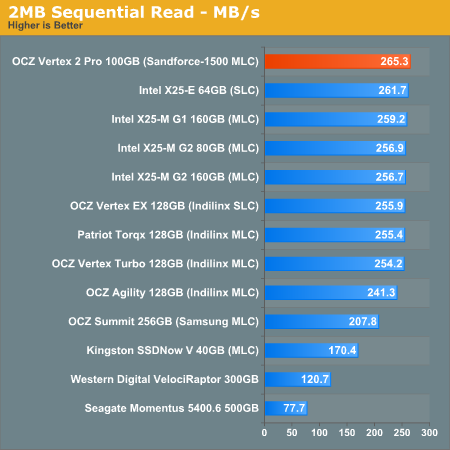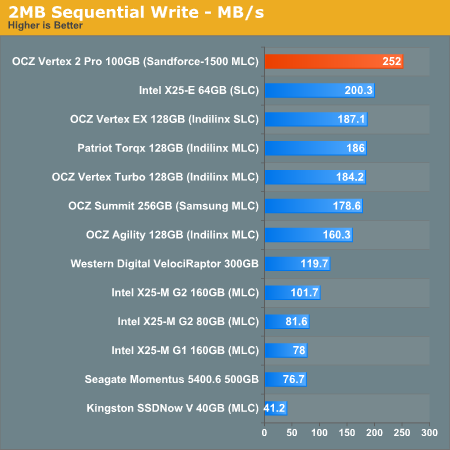OCZ's Vertex 2 Pro Preview: The Fastest MLC SSD We've Ever Tested
by Anand Lal Shimpi on December 31, 2009 12:00 AM EST- Posted in
- Storage
Sequential Performance - Virtually Bound by 3Gbps SATA
Most high end SSDs have sequential read speeds that are pretty much bound by existing 3Gbps SATA interfaces:

OCZ’s Vertex 2 Pro is no different. At around 265MB/s, we’d need to have a redesigned version of the controller with 6Gbps SATA support to go any faster.
It’s the sequential write speed that’s just freakin’ ridiculous:

At 252MB/s the Vertex 2 Pro delivers more sequential write speed than even the best SLC based SSDs. We’re almost bound by 3Gbps SATA here!










100 Comments
View All Comments
blowfish - Friday, January 1, 2010 - link
80GB? You really need that much? I'm not sure how much space current games take up, but you'd hope that if they shared the same engine, you could have several games installed in significantly less space than the sum of their separate installs. On my XP machines, my OS plus programs partitions are all less than 10GB, so I reckon 40GB is the sweet spot for me and it would be nice to see fast drives of that capacity at a reasonable price. At least some laptop makers recognise the need for two drive slots. Using a single large SSD for everything, including data, seems like extravagant overkill.Gasaraki88 - Monday, January 4, 2010 - link
Just as a FYI, Conan take 30GB. That's one game. Most new games are around 6GB. WoW takes like 13GB. 80GB runs out real fast.DOOMHAMMADOOM - Friday, January 1, 2010 - link
I wouldn't go below 160 GB for a SSD. The games in just my Steam folder alone go to 170 GB total. Games are big these days. The thought of putting Windows and a few programs and games onto an 80GB hard drive is not something I would want to do.Swivelguy2 - Thursday, December 31, 2009 - link
This is very interesting. Putting more processing power closer to the data is what has improved the performance of these SSDs over current offerings. That makes me wonder: what if we used the bigger, faster CPU on the other side of the SATA cable to similarly compress data before storing it on an X25-M? Could that possible increase the effective capacity of the drive while addressing the X25-M's major shortcoming in sequential write speed? Also, compressing/decompressing on the CPU instead of in the drive sends less through SATA, relieving the effects of the 3 GB/s ceiling.Also, could doing processing on the data (on either end of SATA) add more latency to retrieving a single file? From the random r/w performance, apparently not, but would a simple HDTune show an increase in access time, or might it be apparent in the "seat of the pants" experience?
Happy new year, everyone!
jacobdrj - Friday, January 1, 2010 - link
The race to the true 'Isolinear Chip' from Star Trek is afoot...Fox5 - Thursday, December 31, 2009 - link
This really does look like something that should have been solved with smarter file systems, and not smarter controllers imo. (though some would disagree)Reiser4 does support gzip compression of the file system though, and it's a big win for performance. I don't know if NTFS's compression is too, but I know in the past it had a negative impact, but I don't see why it wouldn't perform better if there was more cpu performance.
blagishnessosity - Thursday, December 31, 2009 - link
I've wondered this myself. It would be an interesting experiment. There are http://en.wikipedia.org/wiki/Comparison...systems#... (NTFS, Btrfs, ZFS and Reiser4). In windows, I suppose this could be tested by just right clicking all your files and checking "compress" and then running your benchmarks as usual. In linux, this would be interesting to test with btrfs's SSD mode paired with a low-overhead io scheduler like noop or deadline.What interests me the most though is SSD performance on a http://en.wikipedia.org/wiki/Log-structured_file_s... as they theoretically should never have random reads or writes. In the linux realm, there are several log-based filesystems (JFFS2, UBIFS, LogFS, NILFS2) though none seem to perform ideally in real world usage. Hopefully that'll change in the future :-)
blagishnessosity - Thursday, December 31, 2009 - link
correction:There are http://en.wikipedia.org/wiki/Comparison...systems#...">several filesystems that support transparent compression (NTFS, Btrfs, ZFS and Reiser4).
What interests me the most though is SSD performance on a http://en.wikipedia.org/wiki/Log-structured_file_s...">Log-based filesystem as they theoretically should never have random reads or writes.
(note to web admin: the comment wysiwig does not appear to work for me)
themelon - Thursday, December 31, 2009 - link
Note that ZFS now also has native DeDupe support as of build 128http://blogs.sun.com/bonwick/en_US/entry/zfs_dedup">http://blogs.sun.com/bonwick/en_US/entry/zfs_dedup
grover3606 - Saturday, November 13, 2010 - link
Is the used performance with trim enabled?